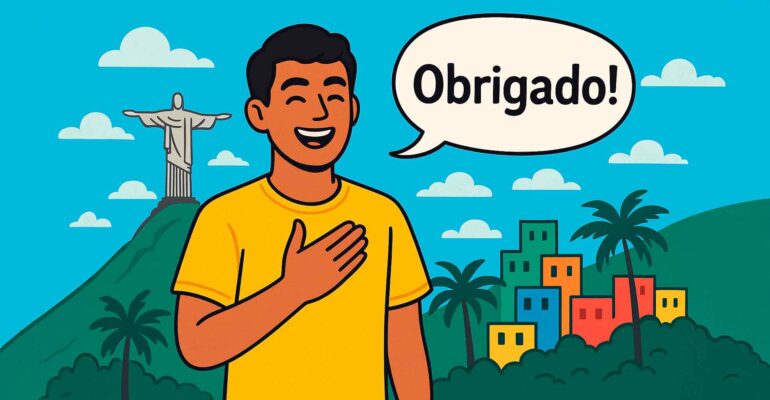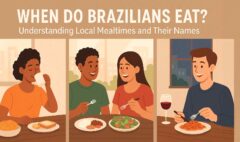What “Thank You” Means in Portuguese
What “Thank You” Means in Portuguese
Introduction
Let’s be real—saying “thank you” is one of the first things we learn when picking up a new language, right? And in Portuguese, knowing how to say it properly can open doors, spark smiles, and help you make friends fast. Whether you’re traveling to Brazil, chatting with a Portuguese speaker online, or diving deep into the culture, understanding how to say “thank you” and when to say it is key.
The Basic Translation
“Obrigado” vs “Obrigada”
In Portuguese, “thank you” translates to “obrigado” or “obrigada”. It literally means “obliged,” as in “I am obliged (to you).”
-
Men say: “obrigado”
-
Women say: “obrigada”
Yes, the form you use depends on your gender, not the gender of the person you’re talking to.
How Gender Plays a Role
This gendered language might feel odd at first, especially if your native language doesn’t have gendered words. But think of it this way: you’re saying “I’m obliged,” and Portuguese requires that your adjectives agree with your gender.
When to Use Each Form Correctly
Just remember:
-
João says: Obrigado!
-
Maria says: Obrigada!
And that’s it!
Pronunciation Tips
How to Say “Obrigado/Obrigada” Naturally
“Obrigado” is pronounced: oh-bree-GAH-doo
“Obrigada” is pronounced: oh-bree-GAH-dah
The stress is on the third syllable: GAH.
Common Mistakes Learners Make
-
Overemphasizing the first syllable
-
Forgetting the gender rule
-
Adding a “w” sound like “ow-brigado” (don’t!)
Audio Tips and Mimic Techniques
Mimic native speakers. YouTube videos, songs, and even telenovelas are goldmines. Say it out loud while watching—yes, talk to the screen. It helps!
Formal vs Informal Thanks
How to Thank Formally in Portuguese
Use:
-
Muito obrigado/a (Thank you very much)
-
Agradeço pela ajuda (I appreciate the help)
-
Grato/a (Grateful) — sounds more poetic and formal
Informal and Friendly Ways to Say Thanks
-
Valeu! — like “Thanks, dude!”
-
Brigadão! — a fun, exaggerated “thanks a bunch!”
-
Obrigadinho/a — cute and soft, often ironic
When to Use Which One
Use obrigado/a with strangers, your boss, or in formal situations. Use valeu or brigadão with close friends, peers, or while joking around.
More Ways to Say Thank You in Portuguese
“Valeu” — The Laid-Back Thank You
This is casual, cool, and totally Brazilian. You’ll hear it everywhere.
“Agradecido/a” — Slightly Formal
Used more in written or formal speech. Think of it like saying “I’m thankful.”
“Muito obrigado/a” — Saying “Thank You Very Much”
This is your go-to for stronger gratitude.
Regional Expressions of Gratitude
In Portugal, you might hear:
-
Bem-haja! — more poetic, meaning “may you be well”
In Angola or Mozambique, expressions vary even more with local influence.
Cultural Nuances
Brazilian Portuguese vs European Portuguese
-
In Brazil, you’ll hear “valeu” all the time.
-
In Portugal, people stick to “obrigado/a” more often and may sound more formal overall.
Non-Verbal Ways to Show Gratitude
-
A nod and smile go a long way
-
A thumbs-up is common
-
Handshakes or even hugs among close friends in Brazil
Saying Thank You Across Lusophone Countries
Each Portuguese-speaking country adds its own flavor—Angola, Mozambique, Cape Verde, etc., blend local expressions with Portuguese structure.
Saying “Thanks” in Specific Situations
Thanking Someone for Food
-
Obrigado pelo almoço! (Thanks for the lunch!)
-
Estava delicioso! (It was delicious!)
Thanking Someone for Help or a Favor
-
Obrigado pela ajuda! (Thanks for the help!)
-
Valeu mesmo! (Really appreciate it!)
Thanking in Professional Settings
-
Agradeço a oportunidade. (I appreciate the opportunity.)
-
Muito obrigado por sua atenção. (Thank you very much for your attention.)
Going Beyond “Obrigado”
Expressing Deep Gratitude
-
Estou muito grato/a. (I’m very grateful.)
-
Não sei como agradecer. (I don’t know how to thank you.)
Writing Thank-You Notes or Emails in Portuguese
Start with:
-
Prezado(a)… (Dear…)
-
Gostaria de agradecer por… (I’d like to thank you for…) End with:
-
Atenciosamente, (Sincerely,)
-
Com gratidão, (With gratitude,)
Common Mistakes and How to Avoid Them
Gender Confusion
Always remember:
-
Men = obrigado
-
Women = obrigada
Using “Obrigado” in the Wrong Context
Saying “obrigado” when “valeu” fits better makes things feel stiff. Pay attention to the vibe!
Overusing or Underusing “Thank You”
In Brazil, people say “obrigado” a lot—when receiving something, after service, or even when someone holds a door. Don’t be shy!
Fun Facts About “Obrigado”
The Origin of the Word
“Obrigado” comes from the Latin obligatus, meaning bound or obliged—like you owe someone something. It’s quite poetic!
Funny Misunderstandings by Learners
-
A male saying “obrigada” and getting corrected by a kid
-
Thinking “valeu” means “it was worth it” (which it can… but also just means “thanks”)
How to Practice Saying Thank You
Role-Play Scenarios
Practice:
-
At a restaurant
-
In a store
-
With friends
Apps and Videos for Practice
-
Duolingo, Memrise, and YouTube channels like “Speaking Brazilian” are super useful
-
Try shadowing a conversation with subtitles and repeat everything
Why “Obrigado” is More Than Just a Word
Saying “thank you” in Portuguese isn’t just about getting the grammar right—it’s about showing appreciation, building bridges, and connecting with people. Whether you’re casually tossing out a “valeu” or formally writing a thank-you email, the gesture always matters. So next time someone does something kind for you in a Portuguese-speaking country, say it with confidence: Obrigado! (or Obrigada! 😉)
Learn Portuguese the Brazilian Way! 🇧🇷✨
At The Brazilian Ways, we believe language learning should be fun, immersive, and deeply connected to culture. Our unique courses help you speak Portuguese naturally while experiencing Brazil through its music, films, literature, and dance.
🎶 The Brazilian Music Club – Learn Portuguese through the rhythm and lyrics of Brazilian music.
🎬 The Movie Club – Improve your Portuguese while exploring the best of Brazilian cinema.
📖 The Short Story Club – Enhance your skills by diving into Brazilian literature.
💃 Portuguese for Zouk – Connect with the Zouk dance community while learning Portuguese.
✨ Join a vibrant community of learners and experience Brazil through language! 👉 Explore our programs and start today! 🚀
📲 Follow us on Instagram for more engaging content, language tips, and cultural insights: @thebrazilianways
FAQs
1. Is “obrigado” always necessary?
No, but it’s polite! Brazilians are friendly, and showing appreciation never hurts.
2. Can women say “obrigado”?
Technically, no. Women should say “obrigada,” but native speakers will understand either way.
3. How do I say “thanks a lot” in Portuguese?
Say muito obrigado (for men) or muito obrigada (for women).
4. What’s the most polite way to say thank you?
Use agradeço muito or estou muito grato(a) for extra politeness.
5. What’s the slang version of thank you in Brazil?
Definitely valeu! It’s short, cool, and super common.













